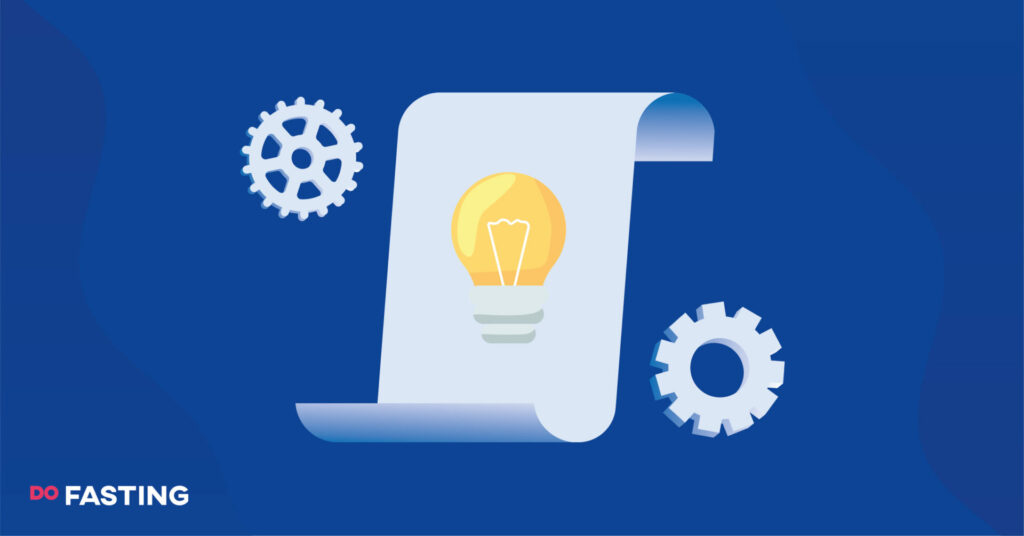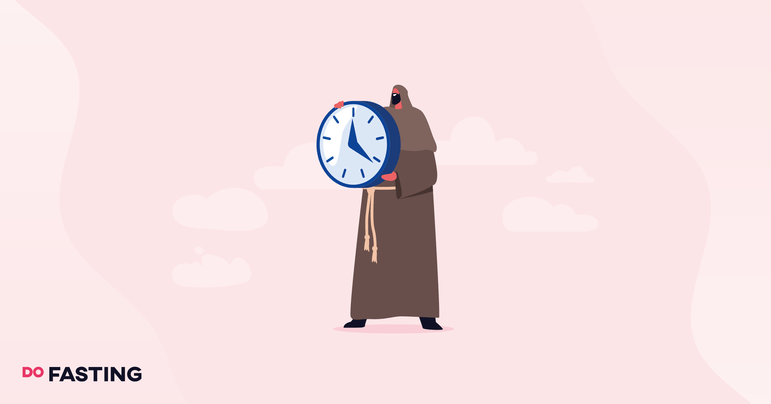Contents
5 Short-Term Side Effects of Intermittent Fasting
Changing your eating pattern may cause physical disturbances in the body. Side effects aren’t a cause for concern, but it’s always better to know about them. You can practice intermittent fasting techniques beforehand to feel more comfortable with your regime.
Let’s take a look at the 5 short-term side effects of fasting:
Take a
1-minute quiz
and discover how much weight you can lose with DoFasting!

1. Hunger and cravings
Not eating for a set period will cause those dreaded hunger pangs.
This can be annoying if you’re trying to maintain ketosis in your body. When you suddenly go from following a normal diet to restricting food for hours, the stomach becomes confused. That’s when you hear the rumbling sounds that don’t go away.
Some people may find that they crave sugary foods. It can lead to episodes of binge eating if you’re not careful about managing it. To avoid those painful hunger cravings, drink lots of water to fill your stomach or take an appetite suppressant like a DoFasting Supplement.
The DoFasting appetite suppressant contains glucomannan and cellulose – two dietary fibers that keep hunger pangs away. They also improve your overall health by reducing bloating and cholesterol levels. All you need to do is drink the powder supplement.
Remember to eat nutrient-dense meals during non-fasting windows. Filling up your stomach may stop those hunger cravings from being so painful. Some good foods include whole fruits, lean meats, eggs, beans, seafood, leafy greens, and nuts.
2. Fatigue, brain fog, low energy
Periodic fasting may cause tiredness due to the lack of extended eating periods.
It is a normal side effect to experience as your body is adjusting to the new intermittent fasting plan. Low energy levels often cause brain fog – a mental state that represents disrupted focus, confusion, forgetfulness, and sluggish thinking.
You can overcome this fatigue by eating more during the fasting program. Even if you’re on a low-calorie diet, try to consume foods full of important nutrients. This might be chicken, eggs, and cheese since they’re packed with protein that will fuel your body.
Also, make sure to get plenty of sleep on your weight loss journey. Boosting energy levels can help you exercise and prevent fasting headaches. If you feel too weak while intermittent fasting, the body won’t be able to burn stubborn fat efficiently.
3. Low blood sugar
Going without food for a set period of time can lower your blood sugar levels. Those with hypoglycemia might struggle with this new adjustment for a while. If you get really low blood sugar on this eating plan, stop fasting right away and eat some big meals.
Common signs of low blood sugar include sweating, trembling limbs, pounding headaches, and intense hunger cravings. To avoid feeling like this while intermittent fasting, eat lots of nutrient-dense meals that keep your sugar levels high.
People with type 2 diabetes usually try alternate day fasting when lowering their blood sugar. This is completely fine if you monitor glucose production throughout your fasting regime. It’s always better to be extra careful and stay safe than put yourself at risk.
4. Bad breath
No one wants bad breath, but it’s perfectly normal when fasting. It happens due to the lack of salivary flow and increased acetone. If the body doesn’t produce enough saliva, we are less protected against oral bacteria that would otherwise cause bad breath.
Chewing some mint gum may not stop that odor in your mouth. You just have to wait until your body feels comfortable with the eating routine. In the meantime, you can brush your teeth, scrape the tongue, use mouthwash, and floss your teeth more often.
One thing to note is that gum isn’t allowed while intermittent fasting. Even though it doesn’t have calories, your digestive system still thinks you’re eating something. This may trigger bloating and constipation just from chewing on some simple gum.
5. Irritability and other mood swings
Feeling annoyed is bound to happen when you have low energy. Your body is craving food you can’t have, so it might be upsetting on your weight loss journey. Don’t worry, those regular mood swings will disappear once a routine is established.
If you want to avoid that irritability, try beginner intermittent fasting programs. This will ease you into the new eating regime. The 12/12 method is a good first choice for those who need shorter fasting periods, as you’ll be splitting the time equally.
5 Long-Term Side Effects of Intermittent Fasting
You should never perform long-term fasting when losing weight. Following this eating plan can cause serious health problems that ruin your overall progress. It’s not worth doing the fasting regime for longer than a few weeks, so keep that in mind beforehand.
Here are some 5 long-term side effects of fasting:
1. Hair loss
You might start to notice more hair shedding while fasting. It is known as telogen effluvium – temporary hair loss usually occuring on the top of your scalp. Not everyone will experience this side effect, but it’s possible if you fast for too long.
Losing hair means you have nutritional deficiencies. Your body doesn’t have enough nutrients to grow hair properly, so it begins to shed in clumps. People would have to do intermittent fasting for longer than six months to notice these extensive changes.
Make sure to set short-term goals and eat lots of nutrient-dense foods outside of the fasting period. Consume lots of healthy fats, like dark chocolate, avocado, cheese, and whole eggs. This will fill you up while feeding the body with essential minerals.
2. Changes in the menstrual cycle
The female reproductive system is sensitive to calorie intake. Not many people know this, but fasting intermittently can actually stop your periods from happening. This is due to the hypothalamus being unable to regulate hormones promoting menstruation.
You can avoid this by stopping intermittent fasting around the time of your period. The body needs time to release hormones, so don’t go overboard with this eating plan. Long-term fasting increases stress levels, which also delays or stops your cycle.
3. Malnutrition
Reducing calories is perfectly safe, but following extreme intermittent fasting regimes can lead to malnutrition. This is a serious condition that refers to the lack of nutrients in your diet. Many people fast for too long and starve their bodies of important minerals.
If you regularly fast for long periods, you might experience severe tiredness, poor concentration, muscle weakness, and depression. Speak to a registered dietitian and gain their advice on how to fast properly without damaging your health.
Take a
1-minute quiz
and discover how much weight you can lose with DoFasting!

4. Sleep disturbances
Research suggests intermittent fasting can trigger sleep disturbances, and insomnia is considered a common side effect of IF. This is due to fluctuating hormone levels and other unwanted changes in your body. Fasting may decrease the amount of melatonin – a hormone that helps regulate sleep patterns.
Other people might not experience this side effect, but it’s common among those who fast for long periods. Not getting enough high-quality sleep will also slow down weight loss. The disrupted hormones increase your appetite, leading to possible binge eating.
Make sure to avoid regular fasting periods that will harm your health. A long-term intermittent fasting regimen will only cause complications, like insomnia, high blood pressure, and depression.
5. Digestive problems
People with a sensitive stomach might face digestive problems. You could have constipation, bloating, nausea, or diarrhea after fasting. The sudden reduction in food may confuse the digestive system and slow down the natural process dramatically.
Time-restricted feeding can strengthen your gut but might also weaken it after a while. It’s human nature to eat frequently and give the body more fuel. However, changing that routine may stop the gut from digesting food properly and absorbing the nutrients.
Never make intermittent fasting a long-term goal. Always having an empty stomach is not healthy and will only lead to weight gain and other future risk factors.
Ways To Reduce Fasting Side Effects
There are ways you can reduce the negative changes that come from fasting, and you should also understand the pros and cons before trying this eating plan.
Here are four ways you can reduce intermittent fasting side effects:
Consult your doctor
A doctor’s consultation is especially important before starting. People with medical conditions or taking certain medications need extra guidance. You should talk to a healthcare professional and question them about possible adverse reactions.
Follow a healthy diet
Those who want to achieve weight loss need to follow a healthy diet. Not eating the right foods can harm your body and trigger those bad physical changes. Consume many nutrient-dense products containing protein, carbohydrates, water, and vitamins.
Listen to your body
If fasting causes any pain or discomfort, stop the regime completely. Your body has a way of telling you what it needs to function. Don’t ignore signs that point toward your deteriorating health. Most wellness professionals will tell you that certain fat loss methods don’t work for everyone – you just need to find the right routine.
Get an app to make your efforts easier
Having everything in one place can help you stay healthy and follow intermittent fasting safely. There are plenty of apps that guide you through this new eating schedule.
You can see how much time has passed since the fasting/eating window began, how many liters of water you consumed that day, how many calories, and even how much weight you have lost so far during fasting (weekly weighing sessions).
The DoFasting app contains all of those helpful features. Depending on your preferences, there are unique intermittent fasting regimens to choose from. It also has 100% science-based tips that guide you through your personalized weight loss journey.
Do All Types of Intermittent Fasting Have Side Effects?
Not all types of fasting methods cause negative changes, but the more advanced eating schedules can do more harm. It might be best to avoid these if you’re new to fasting.
Below, you’ll find the most popular intermittent fasting types:
- Time-restricted eating: You have set fasting and eating windows, like the 16/8, 14/10, and 12/12 methods. This is very good for beginners and advanced fasters.
- The twice-a-week method: People can eat what they want 5 days a week and limit their calories for the remaining 2 days, which is also called the 5:2 regime.
- Alternate-day fasting: This method involves eating normally (still healthy foods) on one day and then completely fasting the next day.
- The eat-stop-eat: A 24-hour fast means you’ll fast for 24 hours, once or twice a week. You might choose not to eat from dinner one day until dinner the next day.
Extreme intermittent fasting methods usually cause bad symptoms. For example, fasting for 24 hours straight isn’t healthy for everyone and can outweigh the benefits of intermittent fasting. Always start with beginner regimes to see how suitable they are.
Who Should Avoid Intermittent Fasting?
People with past eating disorders or frequent disordered eating should avoid fasting completely. Reducing your calories may not benefit your mental health. If you currently have an eating disorder, don’t try any new eating patterns, even beginner ones.
Pregnant and breastfeeding women should usually stay away from fasting. They need extra nutrients to feed their baby and support natural growth. Some methods can also promote fertility issues, causing changes in menstruation and metabolism.
Other factors include sleep problems, digestive issues, and autoimmune diseases. Anyone who suffers from these health conditions should stay clear of intermittent fasting. You might want to relish the health benefits, but it’s not worth the possible adverse effects.
Here is a summary of who should not try fasting:
- Those with a history of eating disorders
- Regular disordered eating
- Pregnant or breastfeeding women
- Those who have common sleep problems
- People with digestive issues
- Those who have weak immunity
- Patients on strong medication
Take a
1-minute quiz
and discover how much weight you can lose with DoFasting!

Conclusion
There are lots of intermittent fasting side effects you could experience, but that doesn’t mean they will happen. Not eating food for long periods can disrupt your body’s natural functions, so only make this eating regime a short-term fitness goal.
Speak to a registered dietitian before starting the new eating schedule. They can offer professional advice about looking after your health and how you can find the right diet. People with certain medical conditions should find another weight loss plan.
See how DoFasting will improve your life
Find out what works for you with this 60-sec quiz approved by our experts and get your personal revolutionary fasting assistant.
Start the Quiz














